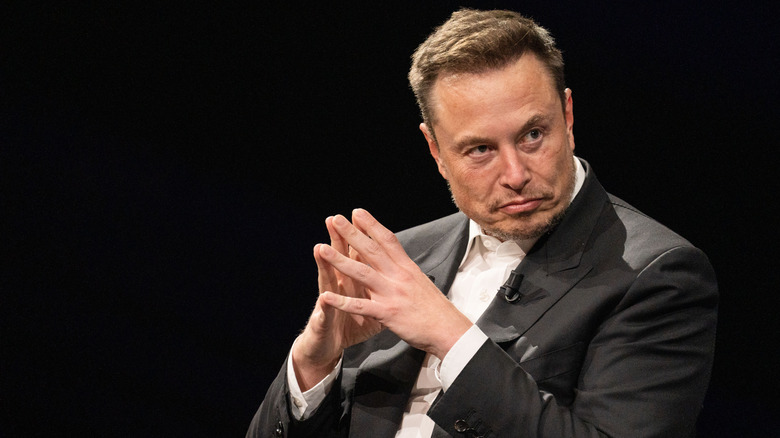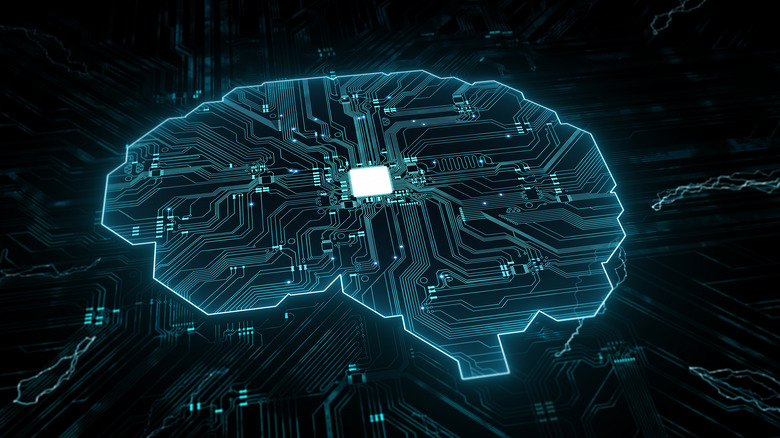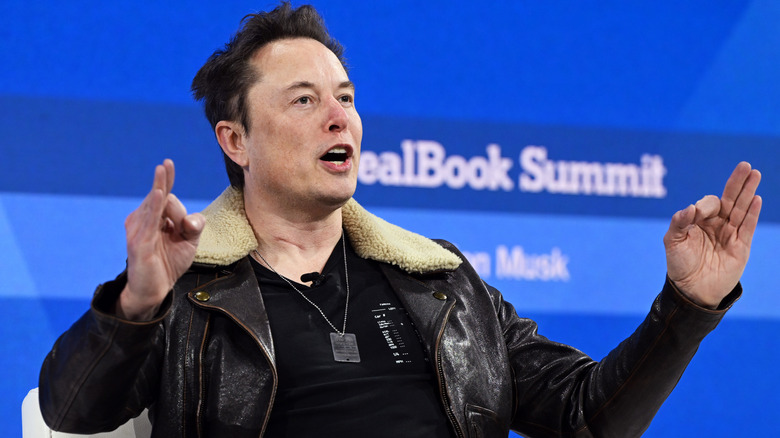What Is Neuralink And What Does Elon Musk Say It Can Do?
On paper, Neuralink sounds like the stuff of science fiction. A quick brain implant, performed by a robot, gives its user the ability to perform what is essentially digital telepathy. Anything connected with the device can be controlled through thoughts alone. Memories could be stored and replayed in ultra-high definition. You could genuinely have a song stuck in your head. Or at least you could if billionaire Elon Musk's claims about the device's potential hold water.
The controversial brain chip was recently cleared for human trials by the FDA, and a human has already had one of the chips embedded into their grey matter. That patient, according to Musk, is "recovering well," and "Initial results show promising neuron spike detection." Neuralink is also accepting volunteers for further trials, though participation is only open to people who have "limited or no ability to use both hands due to cervical spinal cord injury or amyotrophic lateral sclerosis (ALS)."
But what is Neuralink? What does Elon Musk think it is? And is it worth having a robot poke a bunch of wires into your brain with a needle? Here, we'll take a look at the potential medical impact of the device, its realistic applications, and some of the claims Musk has made about one of his more controversial projects. Some of them aren't quite as wacky as nuking Mars, but they're probably equally as likely to happen.
What is Neuralink?
To put it simply, Neuralink is a chip that allows people to interact with various devices using their thoughts alone. The list of devices includes things like smartphones and computers but could theoretically be expanded to almost anything. Think of the modern smart home. Every device connected to the network can be controlled with an app or smart home hub. Neuralink could be used to control those devices in a similar way.
Neuralink is also designed to interact with the body in various ways and could be particularly helpful in treating people with spinal injuries. The brain implant could be paired with another implant that bypasses a damaged or destroyed part of the spinal cord. It could then be used to send signals to limbs and allow a disabled person to walk again or regain function in their arms.
It is implanted via a robot, which uses a needle to implant "threads" into various areas of the brain. The device itself consists of those threads, chips, and electronics, a "biocompatible enclosure," and a battery that can be charged from outside the body. The robot is necessary because, according to Neuralink, the threads are too fine to be implanted with a human hand.
All of this is angled towards increasing quality of life and accessibility for individuals with disabilities. The modern world is already tech-heavy, and the "Internet of Things" is only going to continue to grow. But the most famous name backing Neuralink, Elon Musk, has plans to take things further than that.
What does Musk say it can do?
Neuralink's official customer base is people who have suffered severe spinal injuries or are affected by ALS. Elon Musk himself has repeatedly talked about the potential benefits paraplegics and people with quadriplegia will garner from the brain implant. However, Musk didn't just stop there. Over the years, the billionaire has made several claims about Neuralink, which could be considered somewhat outlandish. On the medical side of things, this includes claims that the device could potentially cure blindness. However, you need to look beyond Neuralink's medical potential to see the most outlandish claims Musk has made. One of these claims relates to people without any kind of disability opting to get the implant.
According to Musk, the process could be performed in a doctor's office in just a few minutes before the patient goes on their way. Other claims Musk has made involve the implant being able to stream things like music directly into a person's brain and improving its users' "cognitive ability." So, things like spelling, mathematics, and puzzle solving could be improved with the implant lending a helping hand. One claim may drudge up uncomfortable memories for fans of the show "Black Mirror." The Tesla CEO has claimed that Neuralink could be used to record events as they happen and then replay them in the mind of the individual with the implant. So it sort of works like memories, but it's infinitely more dystopian.
Neuralink does have some obvious benefits for people with disabilities, and the FDA weighs those benefits against potential risks. But bringing a brain chip to the wider market may be trickier than Elon anticipates.
Neuralink faces a few hurdles
While Neuralink has cleared a significant hurdle by gaining approval from the FDA to test the chip on humans, the company still has a long way to go. Other similar products received testing approval years before Neuralink, and none appear to have made it to market as things stand. Neuralink's previous testing, some of which was performed on primates, resulted in the deaths of several animals. Human trials are undoubtedly more stringent than private tests performed on animals, and similar results may kill the project off completely. However, Neuralink's, or at least Musk's, non-medical ambitions face the stiffest challenges by far.
Dr. John Adler, Emeritus Dorothy and Thye King Chan Professor of Neurosurgery and Radiation Oncology at Stanford, told SlashGear that he didn't think we'd see the implants in people without neurological conditions "any time soon" before adding, "It is imaginary thinking for such implants to happen. Non-medical people have no idea how hard it is to effect change in healthcare. In Neurolink's aspirations, Elon will have met more than his match. Could this happen in 50 years, maybe, but even then, I would not hold my breath."
We also have to consider the social side of things. Over the years, many tech products have failed because the general public just hated the idea of them. Concerns over things like privacy are one of the reasons Google Glass failed. Letting "big tech" jam something directly into the organ, which is responsible for your memories, feelings, and thoughts, is likely to be too far for many people. That's without considering the risks involved. So as with many of Elon's claims, it's probably best you take his Neuralink predictions with a pinch of salt.



